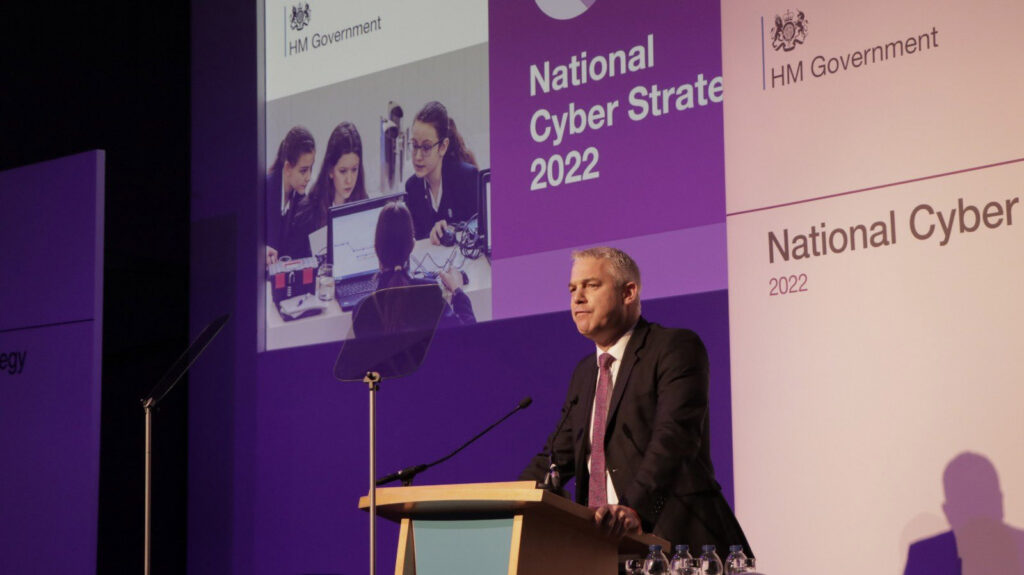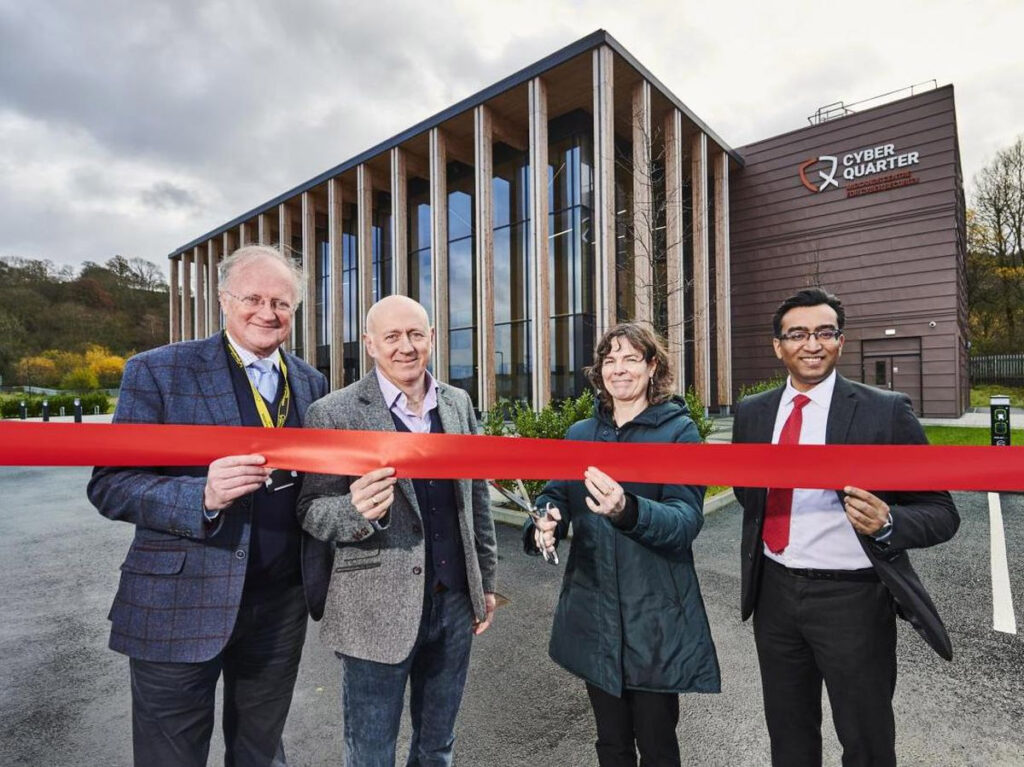The UK’s Cyber Strategy was officially launched in Birmingham today at the International Convention Centre (ICC). The event brought together key stakeholders from cyber and technology to discuss the blueprint and how to implement the key recommendations.
Steve Barclay, the Chancellor of the Duchy of Lancaster, delivered a keynote address that highlighted the five pillars of the strategy: strengthening the UK’s cyber ecosystem; building a resilient and prosperous digital UK; taking the lead in technologies vital to cyber power; Advancing UK global leadership and influence for a secure and prosperous international order; and, Detecting, disrupting and deterring our adversaries to enhance UK security in and through cyberspace.

(Pictured: Steve Barclay, the Chancellor of the Duchy of Lancaster, delivering a keynote address at the Cyber Strategy Launch)
The Minister commented:
“The new National Cyber Strategy transforms how the UK will advance its national interests in cyberspace and is a major milestone following the publication of the Integrated Review earlier this year.”
“It sets out a clear vision for building cyber expertise in all parts of the country, strengthening our offensive and defensive capabilities and ensuring the whole of society plays its part in the UK’s cyber future, and comes with record funding to match.”
Technology organisations from across the West Midlands were invited to participate, including Midlands Cyber, Aston University, Innovation Alliance for the West Midlands, CyberQ Group, Black Country Consortium and the University of Wolverhampton (Cyber Quarter).

(Pictured [Left to Right] Daljinder Mattu, Senior Policy Adviser (regional lead for Midlands) at DCMS, Cesca Nutbeem, Project Coordinator at Midlands Cyber, Chris Woods, CEO & Founder at CyberQ Group, Emma Philpott MBE, CEO of IASME, Prashant Pillai, Professor of Cyber Security at the University of Wolverhampton, Professor Vladlina Benson Director of the Cyber Security Innovation Centre at Aston University and Yiannis Maos, Chief Executive of Birmingham Tech)
“It was great to be at the Cyber Strategy Launch which represents a pivotal moment for technology in the UK. To have the event hosted in Birmingham and to see the West Midlands so well represented is testament to the strength of our tech cluster, something we are extremely proud to lead.”
The event was hosted by Emma Philpott MBE, CEO of IASME (the National Cyber Security Centre’s Cyber Essentials Partner) who are based in Malvern.
The event was opened up with an address from the Mayor of the West Midlands, Andy Street who spoke about his delight at having the strategy launched in Birmingham. He went on to tell the audience that the region has been crowned the UK’s fastest-growing tech sector, with data from the Department for Culture, Media and Sport forecasting that by 2025, tech in the West Midlands could create an extra 52,000 jobs and boost the national economy by £2.7bn.
The West Midlands has a considerable cyber security industry; part of the Midlands Cyber regional cluster including Cyber Valley, with Malvern and Worcestershire. The strong base of industries such as automotive, aerospace and medical devices as well as national critical infrastructure companies means that there is a growing base of cyber security companies supported by considerable academic expertise. PwC has their national cyber security leads in Birmingham and other companies include CyberQ Group and Nettitude (a Lloyd’s Register Group of companies) as well as cyber divisions within companies including AZ Automotive, National Grid and Severn Trent Water.
Chris Woods, CEO & Founder of CyberQ Group commented:
“As a growing international cyber business headquartered in Birmingham, we are proud to see the UK Cyber Strategy launched in our city. We are already very active in the regional ecosystem and this report will help encourage more collaboration across the public and private sectors. It was also good to attend alongside partners like Birmingham Tech who have helped us achieve more through the ScaleUp Programme.”
In 2017, CyberQ was identified by the UK government as a ‘top Cyber Growth Company’ and in 2020, the company secured $2.5m of VC funding to launch into the US. The company recently collaborated with Hays Technology on a Cyber Security Report: Cyber Security & Covid-19
To promote growth and innovation in the UK cyber industry the Government is investing in the Cyber Runway scheme which is helping 107 innovators grow and develop their businesses, with the majority of member companies outside of London and the South East, 45% led by women and 52% run by founders from black and minority ethnic groups.
Sir Jeremy Fleming, Director GCHQ delivered a keynote on the challenges and opportunities ahead for the UK’s cyber sector. He commented:
“The National Cyber Strategy builds on the country’s strong foundations in cyber security that GCHQ’s work has been part of, particularly through the NCSC. But it goes beyond that. It brings together the full range of cyber activities, from skills to communities, and to the use of offensive cyber capabilities through the newly established National Cyber Force.”
“It shows how the UK can build capacity across the country to continue to prosper from the opportunities of cyberspace. And, as a leading responsible cyber power, can build alliances with democratic partners around the world to protect a free, open and peaceful cyberspace.”
The strategy is designed to create a diverse and inclusive cyberspace for all and Professor Prashant Pillai, Professor of Cyber Security at the University of Wolverhampton, was joined by other experts where they discussed the topic and shared ideas on how to make this a reality.

(Pictured: Councillor David Hitchiner, Herefordshire Council leader Chris Ensor, Erika Lewis, director for cyber skills and growth at the National Centre for Cyber Security, and Professor Prashant Pillai at the recent launch of the University of Wolverhampton’s £9 million cyber centre, the Cyber Quarter)
The professor, who is also an Associate Dean for Research and Knowledge Exchange and Director of Cyber Quarter (Midlands Centre for Cyber Security) at the University, commented:
“The expertise and specialist focus of our new centre, combined with the government strategy, will help grow the region’s cyber sector. The area is already home to a highly regarded cyber economy, a diverse workforce, this combined with the knowledge, expertise and opportunities that the centre brings will help to establish Herefordshire as one of the capitals of the cyber security sector.”
“The government strategy talks about collaboration and we are hoping to forge strategic partnerships and relationships with some of the world’s leading expertise in cyber and security, really putting Herefordshire and the Midlands on the international map.”
The strategy will deliver a more integrated and effective regional cyber networks across the UK, enabling stronger partnerships between government, businesses and academia to support sectoral growth and business resilience. The government will work with regional cyber clusters and the recently established UK Cyber Cluster Collaboration (UKC3), the growing number of regional cyber innovation centres and Cyber Resilience Centres, strengthening links between local businesses, academic centres of excellence and law enforcement.
The region is home to its own cyber cluster through Midlands Cyber – a dedicated platform to promote sector growth and collaboration in the region.
The strategy is supported by the £2.6 billion investment in cyber announced in this year’s Spending Review.
You can find out more and read the full strategy here: https://www.gov.uk/government/publications/national-cyber-strategy-2022






